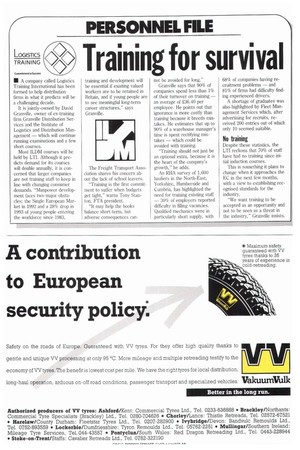8> Training for survival
Page 60

If you've noticed an error in this article please click here to report it so we can fix it.
• A company called Logistics Training International has been formed to help distribution firms in what it predicts will be a challenging decade.
It is jointly-owned by David Granville, owner of ex-training firm Granville Distribution Services and the Institute of Logistics and Distribution Management — which will continue running examinations and a few short courses.
Most ILDM courses will be held by LTI. Although it predicts demand for its courses will double annually, it is concerned that larger companies are not training staff to keep in line with changing consumer demands. "Manpower development faces two major obstacles; the Single European Market in 1992 and a 28% drop in 1993 of young people entering the workforce since 1983,
training and development will be essential if existing valued workers are to be retained in Britain, and if young people are to see meaningful long-term career structures," says Granville.
The Freight Transport Association shares his concern about the lack of school leavers.
"Training is the first commitment to suffer when budgets get tight," warns Tony Stanton, FTA president.
"It may help the books balance short-term, but adverse consequences can
not be avoided for long.
Granville says that 90% of companies spend less than 1% of their turnover on training — an average of 236.40 per employee. He points out that ignorance is more costly than training because it breeds mistakes. He estimates that up to 90% of a warehouse manager's time is spent rectifying mistakes — which could be avoided with training.
"Training should not just be an optional extra, because it is the heart of the company's growth," he adds.
An RHA survey of 1,600 hauliers in the North-East, Yorkshire, Humberside and Cumbria, has highlighted the need for training existing staff — 30% of employers reported difficulty in filling vacancies. Qualified mechanics were in particularly short supply, with 68% of companies having recruitment problems — and 81% of firms had difficulty finding experienced drivers.
A shortage of graduates was also highlighted by Fleet Management Services which, after advertising for recruits, received 200 entries out of which only 10 seemed suitable.
Despite these statistics, the LIE reckons that 70% of staff have had no training since initial induction courses.
This is something it plans to change when it approaches the EC in the next few months, with a view to establishing recognised standards for the industry.
"We want training to be accepted as an opportunity and not to be seen as a threat in the industry," Granville insists.








































































































































